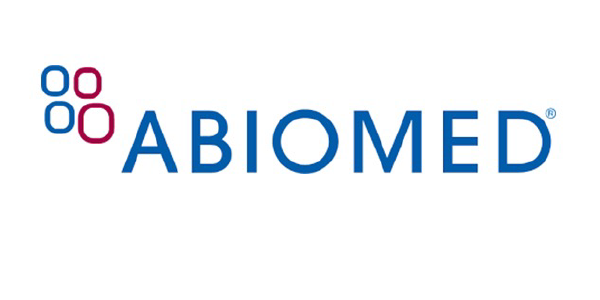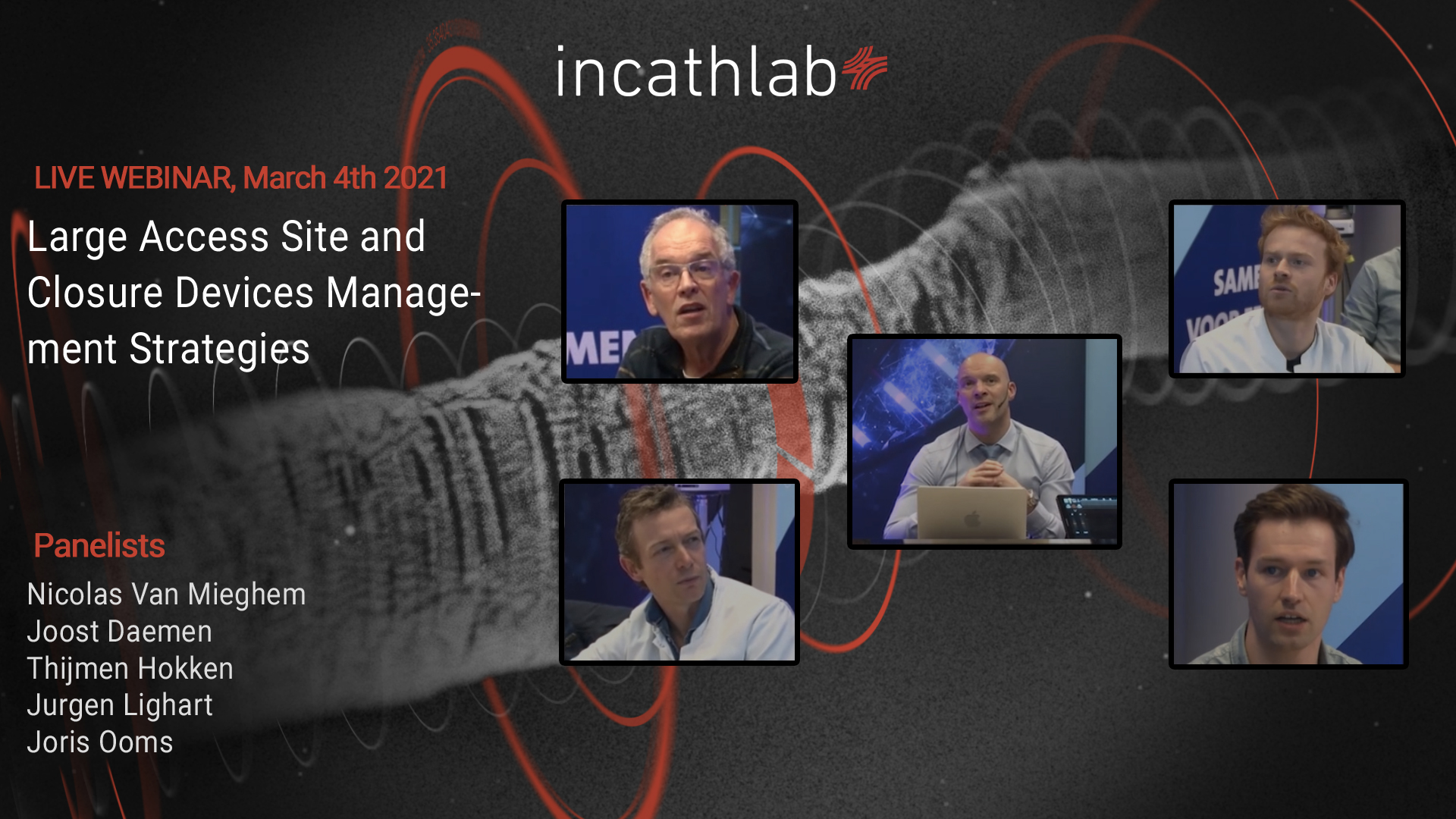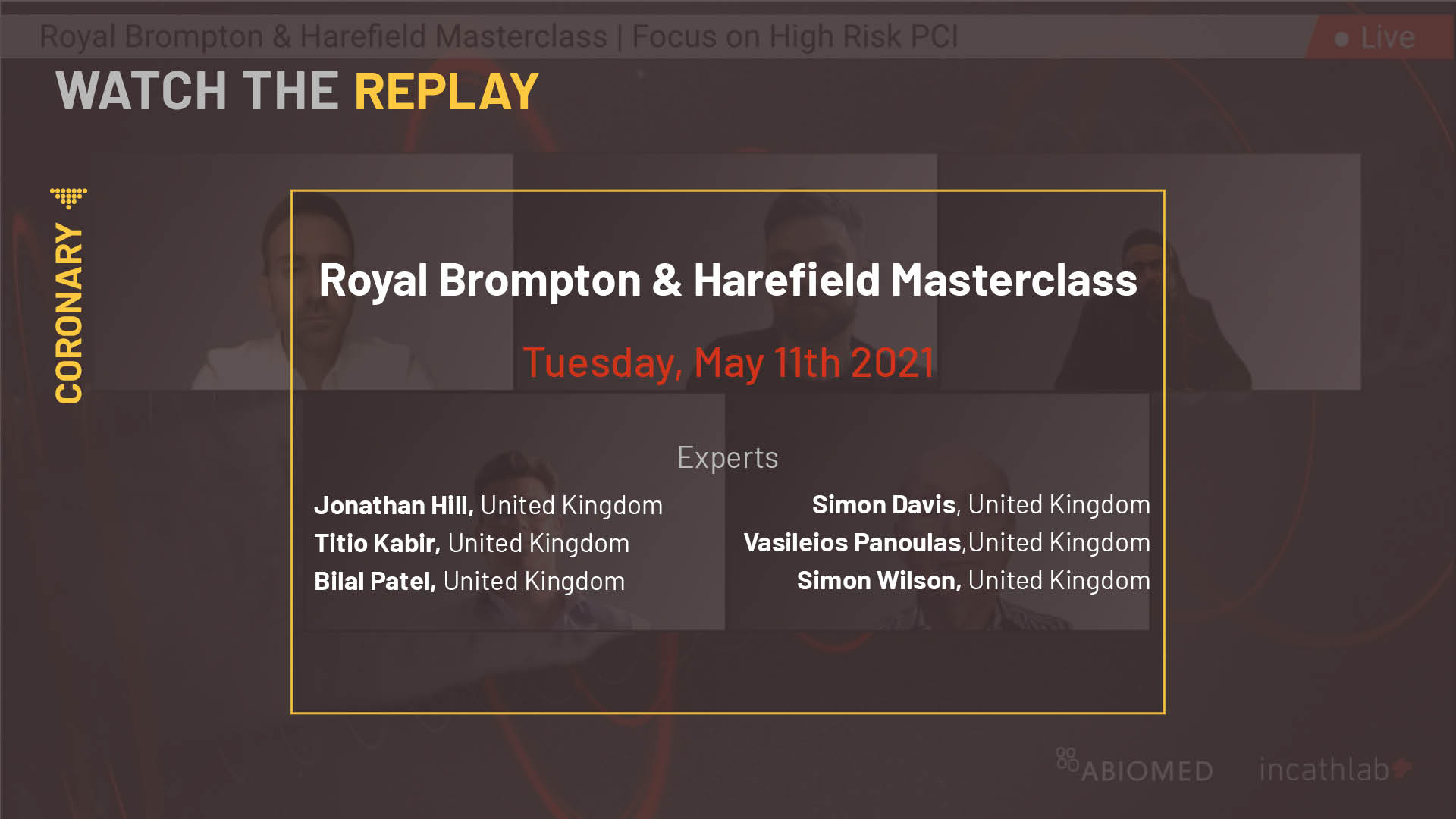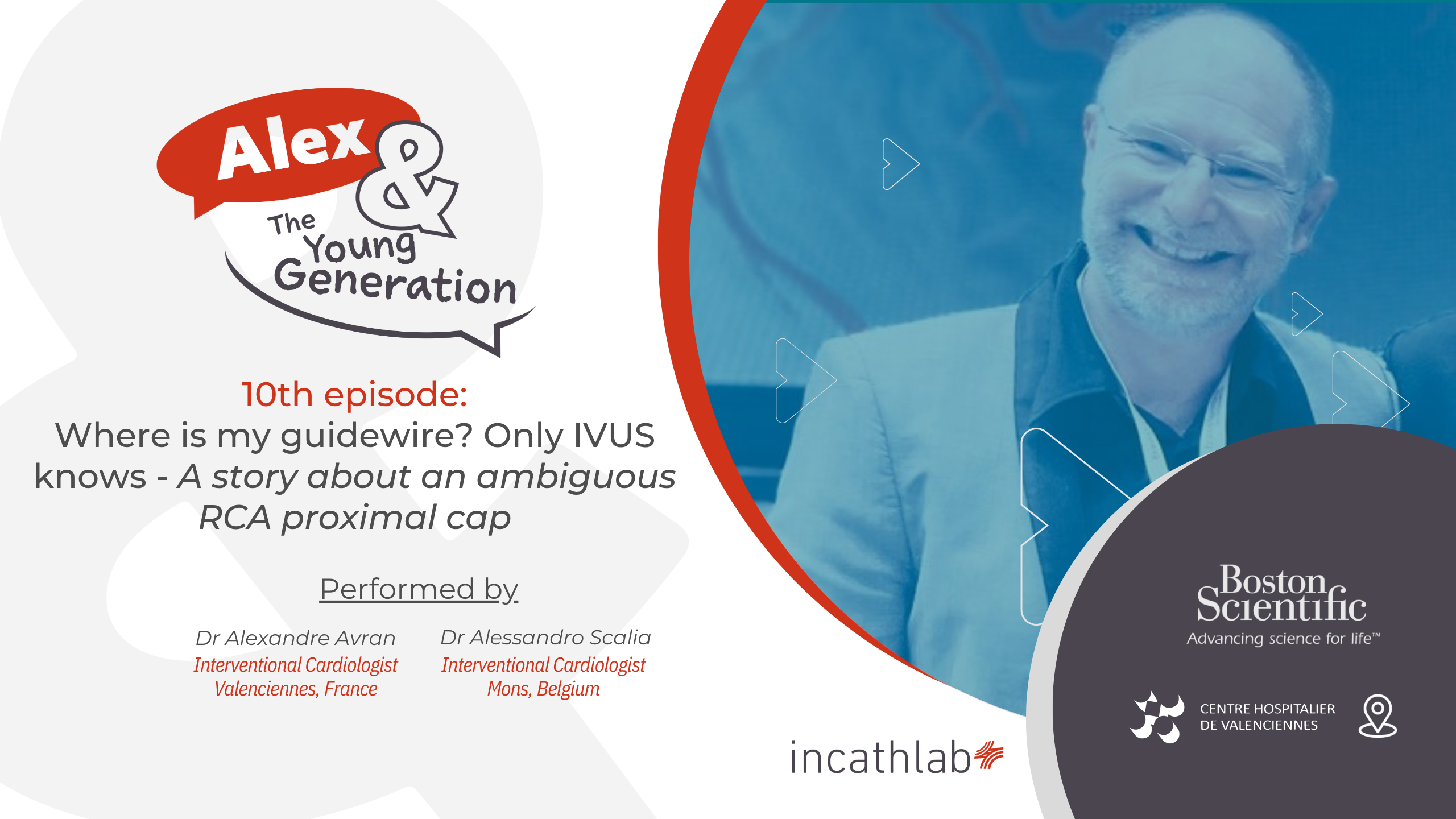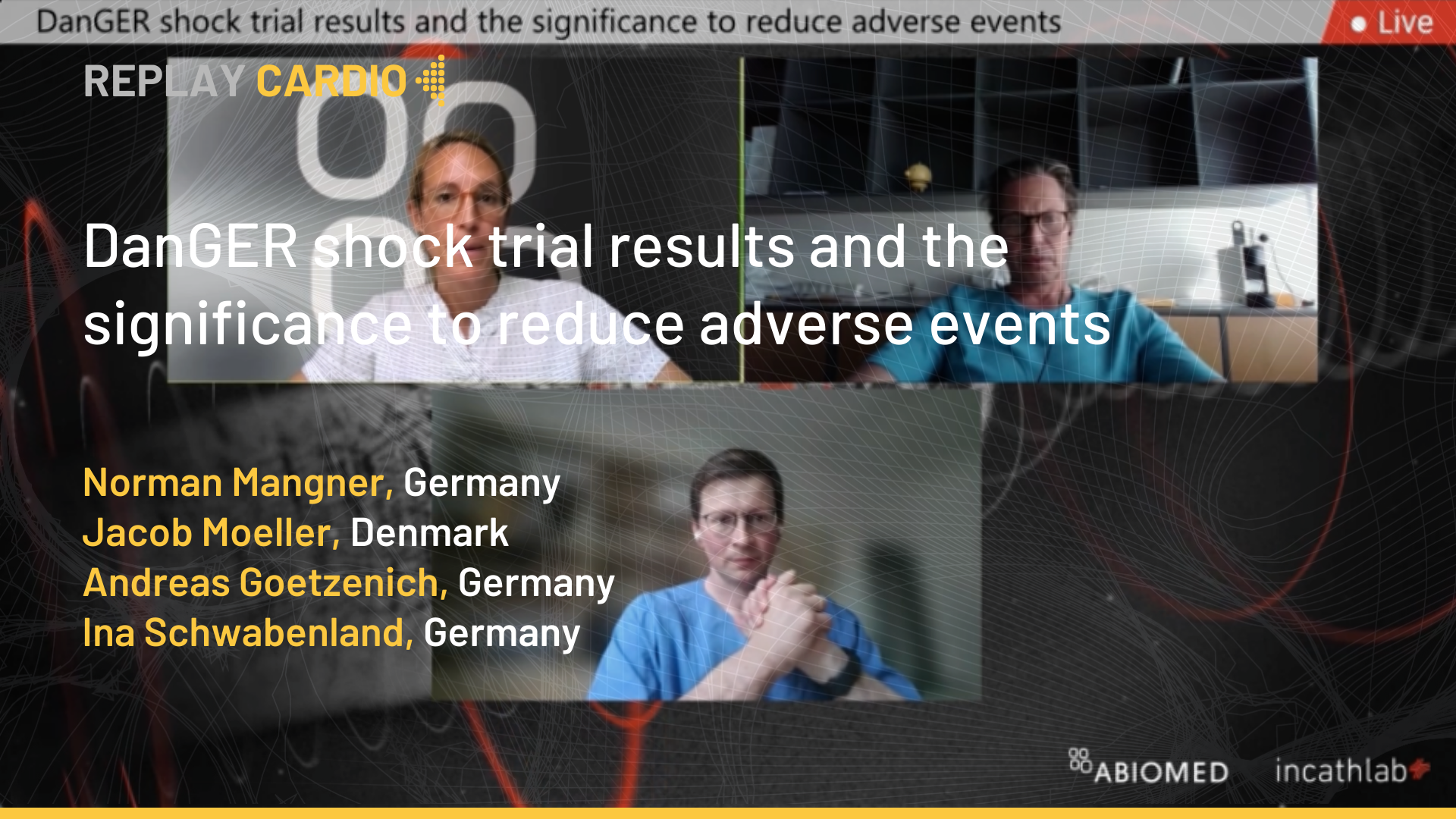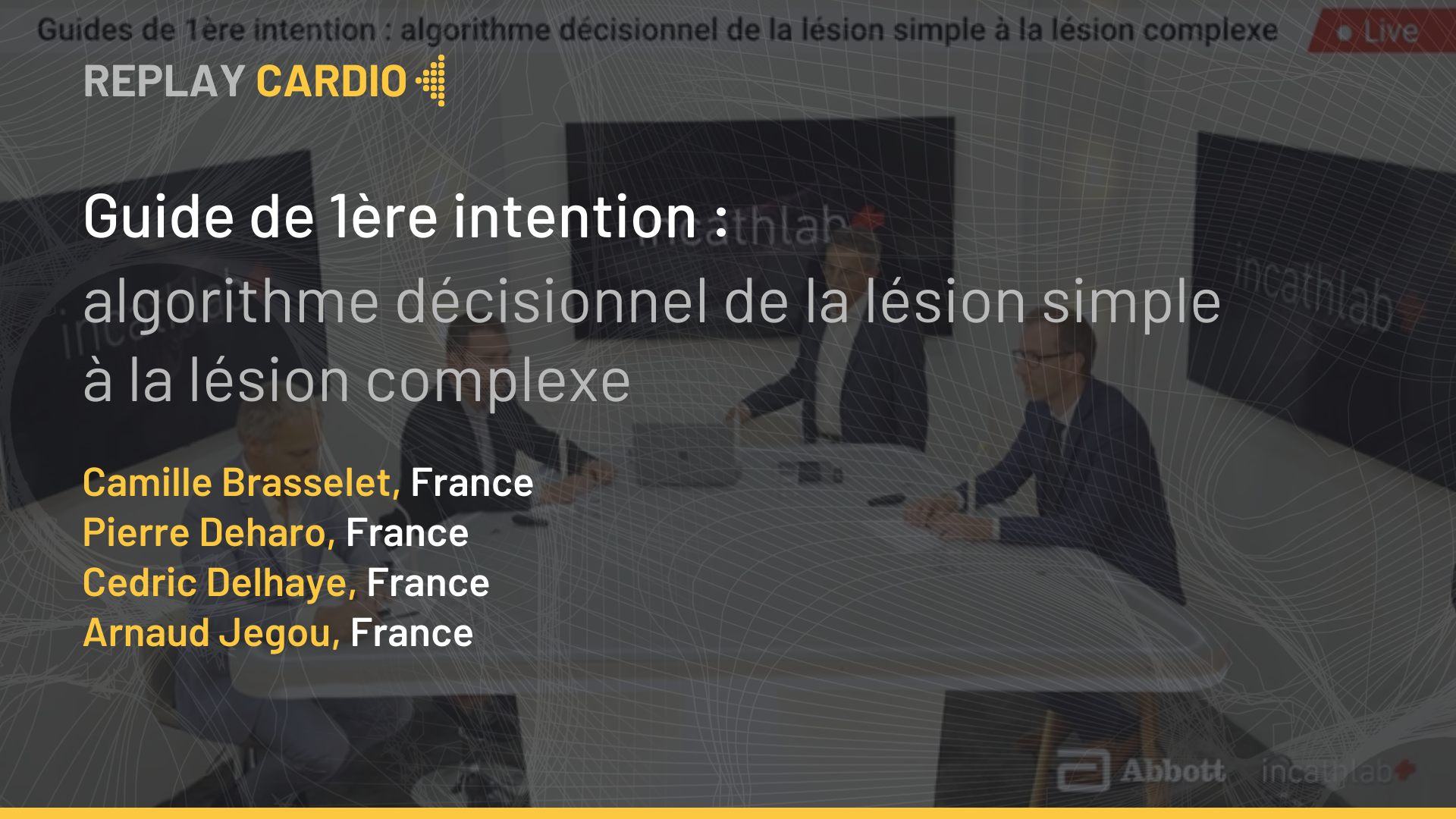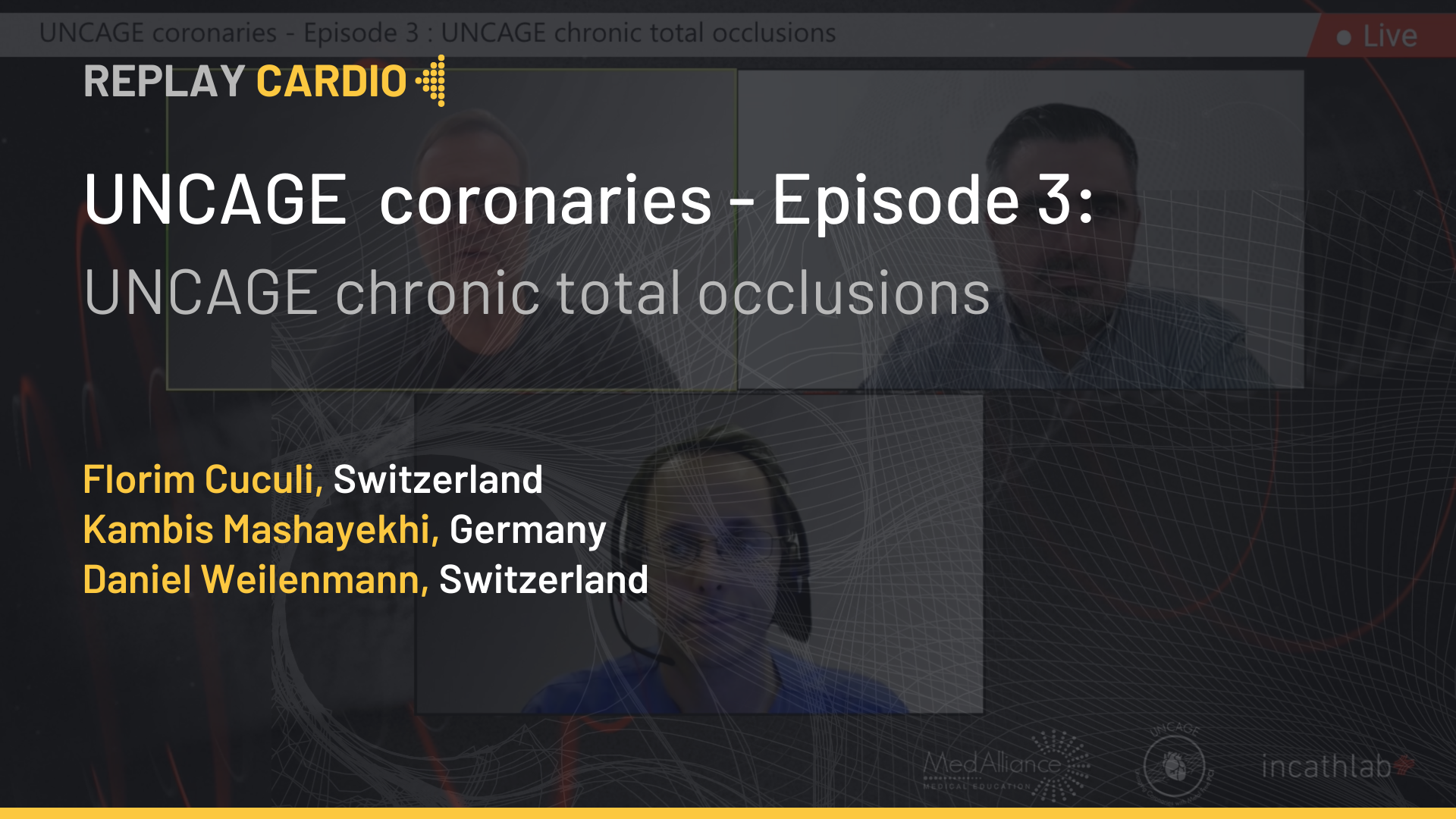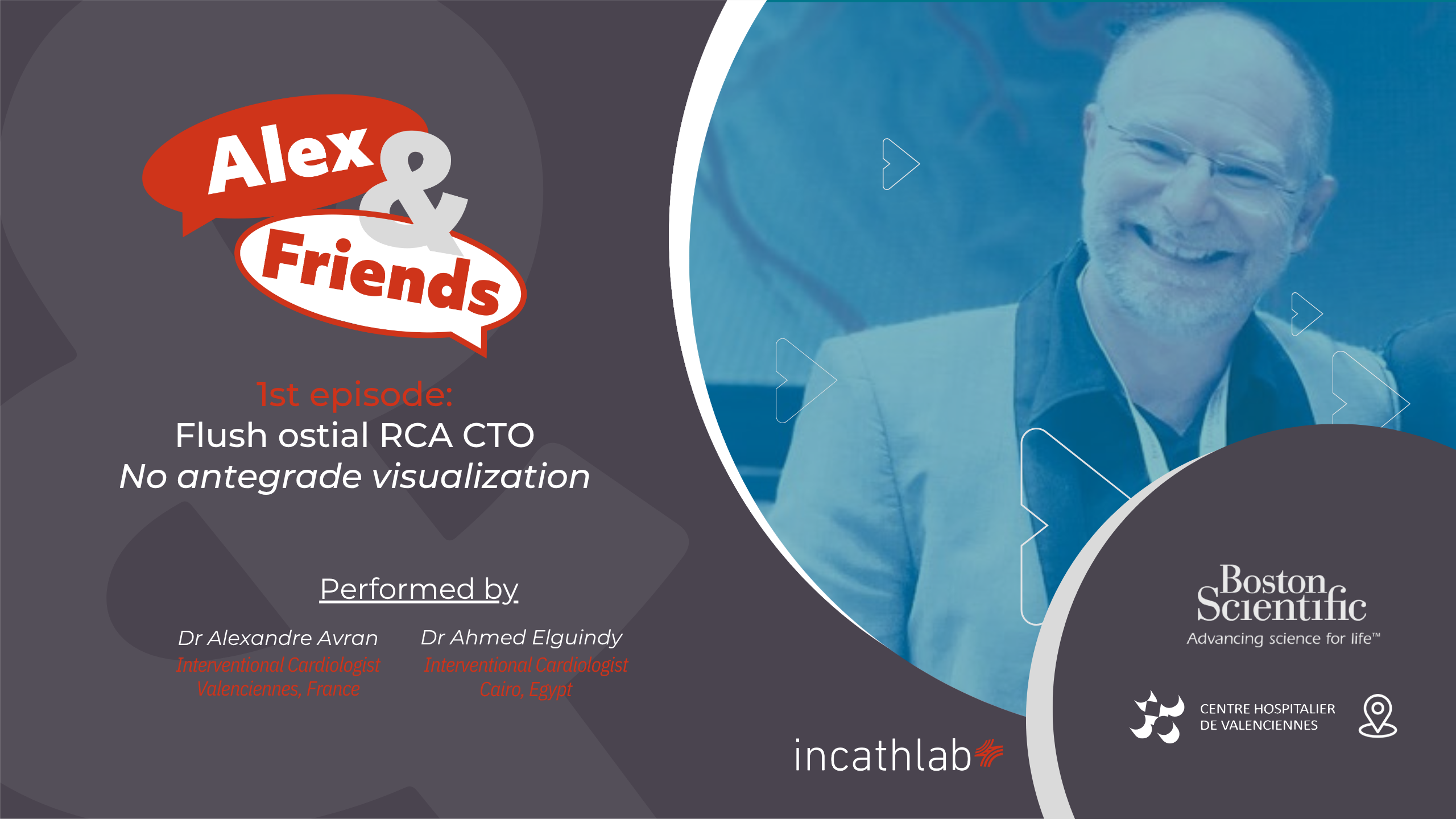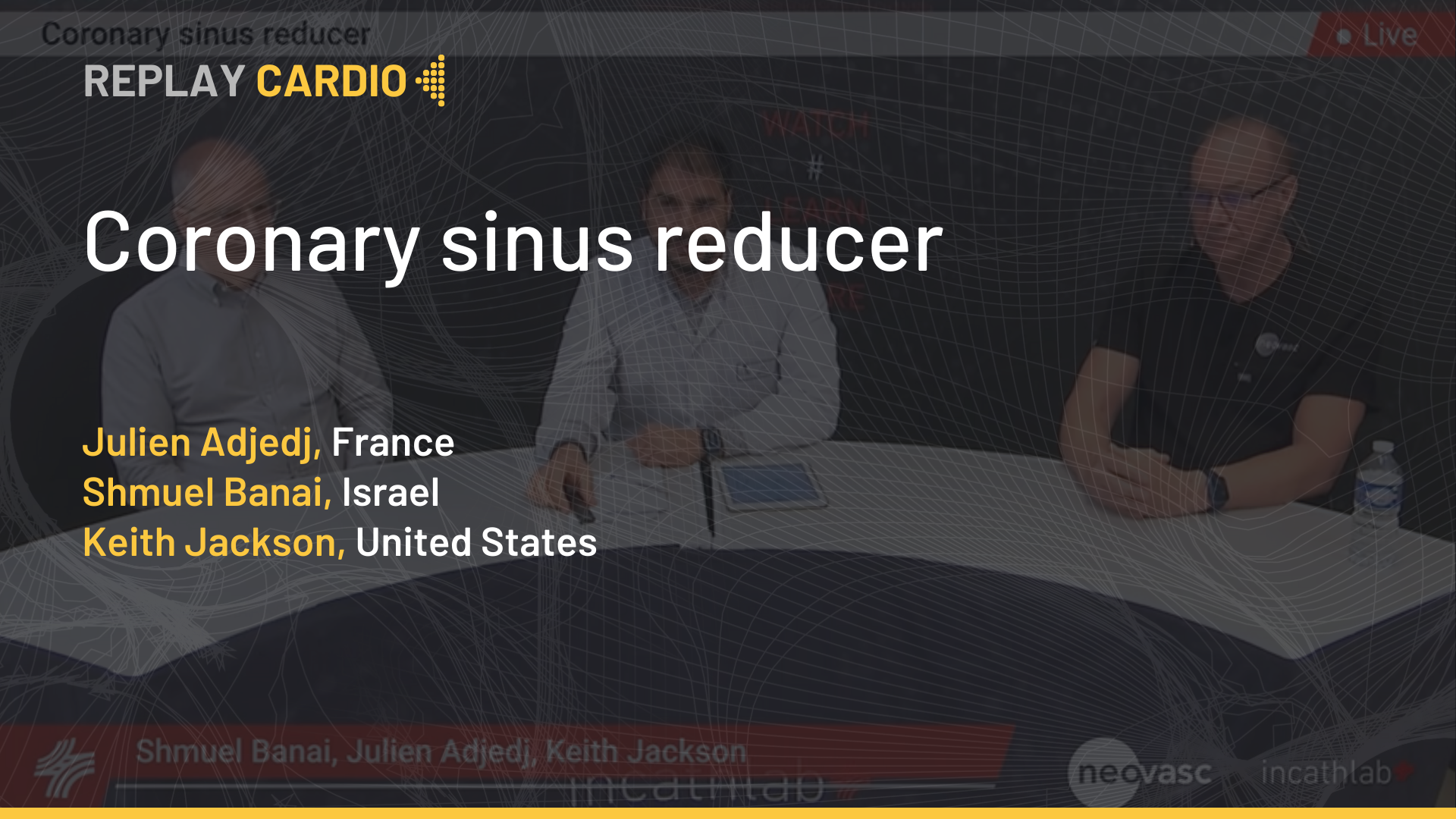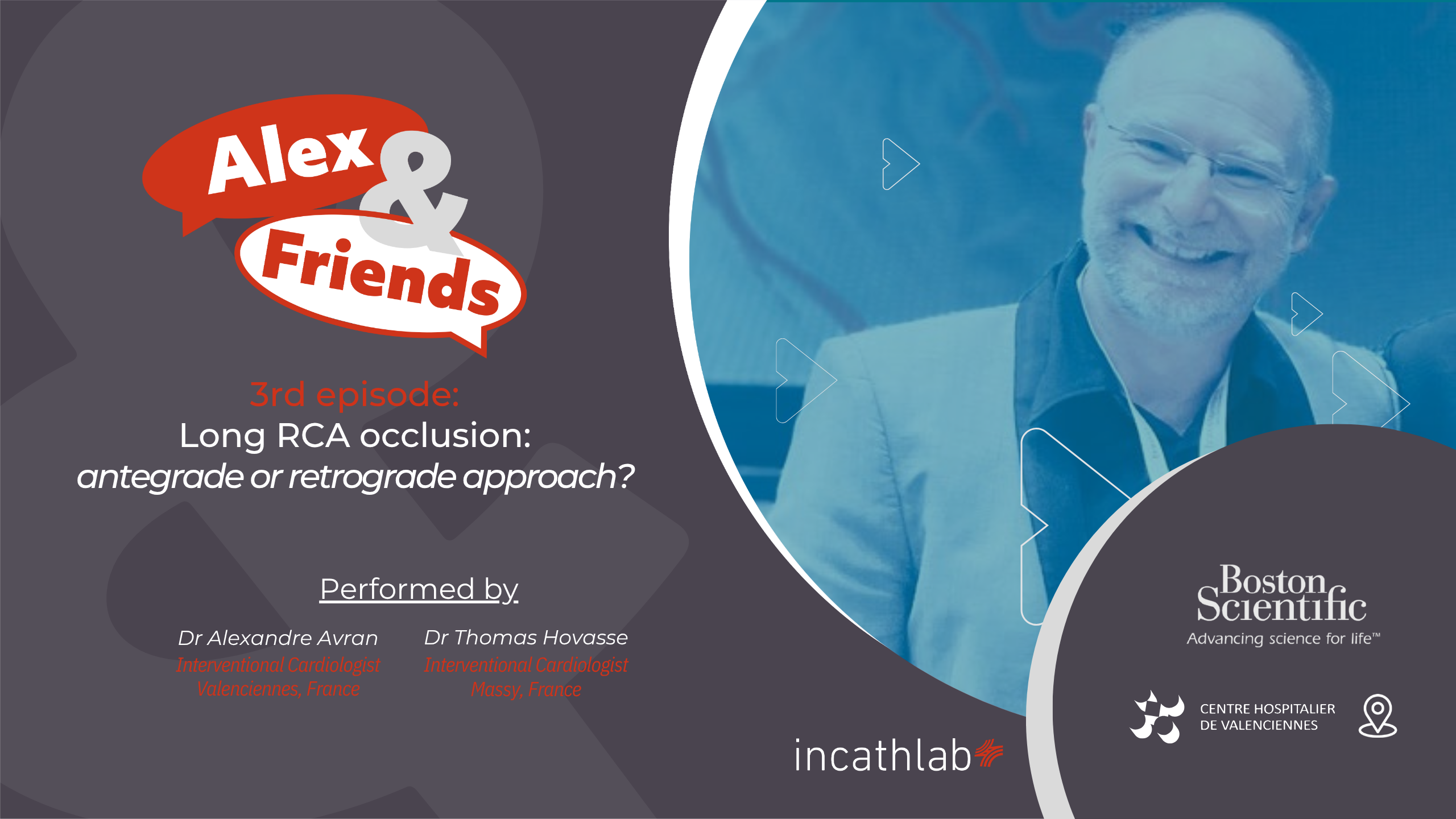×
Il semble que vous utilisiez une version obsolète de internet explorer. Internet explorer n'est plus supporté par Microsoft depuis fin 2015. Nous vous invitons à utiliser un navigateur plus récent tel que Firefox, Google Chrome ou Microsoft Edge.

Devenez membre d'Incathlab et bénéficiez d'un accès complet !
Vous devez être membre pour accéder aux vidéos Incathlab sans limitation. Inscrivez vous gratuitement en moins d'une minute et accédez à tous les services Incathlab ! Vous avez aussi la possibilité de vous connecter directement avec votre compte facebook ou twitter en cliquant sur login en haut à droite du site.
Inscription Connexion
Inscription Connexion
Program
7PM to 8:30PM CET I 6PM to 7:30PM UK TimeModerators: Simon Davies & Jonathan Hill
| 19:00 |
Introduction Simon Davies |
| 19:05 |
Who fits the bill?
Vasileios Panoulas |
| 19:20 |
Case examples
Tito Kabir |
| 19:35 |
Q&A
|
| 19:40 |
The Blackpool experience – how to set up an Impella high risk program
Billal Patel |
| 19:55 |
Q&A
|
| 20:00 |
Next level of high risk PCI, showcasing the interventional toolbox!
Simon Wilson |
| 20:15 | Q&A |
| 20:20 |
Closing remarks
Jonathan Hill |
Learning Objectives
• Which patients benefit the most from High Risk PCI protected with Impella
• Practical tip & trick to operate the Impella device through clinical cases illustrations
• What skills and tools you need to build to perform High Risk PCI protected with Impella
Audience
• Interventional cardiologist interested to improve their skills and technique in High Risk PCI with MCS support.
• Cathlab team/ Heart Team which are developing their CHIP and High PCI program
• Nurses and ICU staff supporting CHIP and High PCI programs
Date du tournage : 11/05/2021
Dernière mise à jour : 24/06/2021
Dernière mise à jour : 24/06/2021
Suggestions
Upcoming, Wednesday 28th February
Where is my guidewire? Only IVUS knows - A story about an ambiguous RCA proximal cap
Alex & The Young Generation - Ep.10
Partager
Mercredi 22 mai 2024 de 15h à 16h (GMT+2)
Honolulu : Mercredi 22 mai 2024 de 04h à 05h (GMT+2)
San Francisco : Mercredi 22 mai 2024 de 07h à 08h (GMT+2)
New York : Mercredi 22 mai 2024 de 10h à 11h (GMT+2)
Buenos Aires : Mercredi 22 mai 2024 de 11h à 12h (GMT+2)
Reykjavik : Mercredi 22 mai 2024 de 14h à 15h (GMT+2)
London / Dublin : Mercredi 22 mai 2024 de 15h à 16h (GMT+2)
Paris / Berlin : Mercredi 22 mai 2024 de 16h à 17h (GMT+2)
Istanbul : Mercredi 22 mai 2024 de 17h à 18h (GMT+2)
Moscou / Dubaï : Mercredi 22 mai 2024 de 18h à 19h (GMT+2)
Bangkok : Mercredi 22 mai 2024 de 21h à 22h (GMT+2)
Shanghai : Mercredi 22 mai 2024 de 22h à 23h (GMT+2)
Tokyo : Mercredi 22 mai 2024 de 23h à 00h (GMT+2)
Sydney : Jeudi 23 mai 2024 de 01h à 02h (GMT+2)
Wellington : Jeudi 23 mai 2024 de 03h à 04h (GMT+2)
San Francisco : Mercredi 22 mai 2024 de 07h à 08h (GMT+2)
New York : Mercredi 22 mai 2024 de 10h à 11h (GMT+2)
Buenos Aires : Mercredi 22 mai 2024 de 11h à 12h (GMT+2)
Reykjavik : Mercredi 22 mai 2024 de 14h à 15h (GMT+2)
London / Dublin : Mercredi 22 mai 2024 de 15h à 16h (GMT+2)
Paris / Berlin : Mercredi 22 mai 2024 de 16h à 17h (GMT+2)
Istanbul : Mercredi 22 mai 2024 de 17h à 18h (GMT+2)
Moscou / Dubaï : Mercredi 22 mai 2024 de 18h à 19h (GMT+2)
Bangkok : Mercredi 22 mai 2024 de 21h à 22h (GMT+2)
Shanghai : Mercredi 22 mai 2024 de 22h à 23h (GMT+2)
Tokyo : Mercredi 22 mai 2024 de 23h à 00h (GMT+2)
Sydney : Jeudi 23 mai 2024 de 01h à 02h (GMT+2)
Wellington : Jeudi 23 mai 2024 de 03h à 04h (GMT+2)
DanGER shock trial results and the significance to reduce adverse events
Partager
Mercredi 4 octobre 2023 de 18h à 18h45 (GMT+2)
Honolulu : Mercredi 4 octobre 2023 de 07h à 07h45 (GMT+2)
San Francisco : Mercredi 4 octobre 2023 de 10h à 10h45 (GMT+2)
New York : Mercredi 4 octobre 2023 de 13h à 13h45 (GMT+2)
Buenos Aires : Mercredi 4 octobre 2023 de 14h à 14h45 (GMT+2)
Reykjavik : Mercredi 4 octobre 2023 de 17h à 17h45 (GMT+2)
London / Dublin : Mercredi 4 octobre 2023 de 18h à 18h45 (GMT+2)
Paris / Berlin : Mercredi 4 octobre 2023 de 19h à 19h45 (GMT+2)
Istanbul : Mercredi 4 octobre 2023 de 20h à 20h45 (GMT+2)
Moscou / Dubaï : Mercredi 4 octobre 2023 de 21h à 21h45 (GMT+2)
Bangkok : Jeudi 5 octobre 2023 de 00h à 00h45 (GMT+2)
Shanghai : Jeudi 5 octobre 2023 de 01h à 01h45 (GMT+2)
Tokyo : Jeudi 5 octobre 2023 de 02h à 02h45 (GMT+2)
Sydney : Jeudi 5 octobre 2023 de 04h à 04h45 (GMT+2)
Wellington : Jeudi 5 octobre 2023 de 06h à 06h45 (GMT+2)
San Francisco : Mercredi 4 octobre 2023 de 10h à 10h45 (GMT+2)
New York : Mercredi 4 octobre 2023 de 13h à 13h45 (GMT+2)
Buenos Aires : Mercredi 4 octobre 2023 de 14h à 14h45 (GMT+2)
Reykjavik : Mercredi 4 octobre 2023 de 17h à 17h45 (GMT+2)
London / Dublin : Mercredi 4 octobre 2023 de 18h à 18h45 (GMT+2)
Paris / Berlin : Mercredi 4 octobre 2023 de 19h à 19h45 (GMT+2)
Istanbul : Mercredi 4 octobre 2023 de 20h à 20h45 (GMT+2)
Moscou / Dubaï : Mercredi 4 octobre 2023 de 21h à 21h45 (GMT+2)
Bangkok : Jeudi 5 octobre 2023 de 00h à 00h45 (GMT+2)
Shanghai : Jeudi 5 octobre 2023 de 01h à 01h45 (GMT+2)
Tokyo : Jeudi 5 octobre 2023 de 02h à 02h45 (GMT+2)
Sydney : Jeudi 5 octobre 2023 de 04h à 04h45 (GMT+2)
Wellington : Jeudi 5 octobre 2023 de 06h à 06h45 (GMT+2)
Guides de 1ère intention :
algorithme décisionnel de la lésion simple à la lésion complexe
Partager
Mercredi 23 novembre 2022 de 17h à 18h (GMT+1)
Honolulu : Mercredi 23 novembre 2022 de 06h à 07h (GMT+1)
San Francisco : Mercredi 23 novembre 2022 de 08h à 09h (GMT+1)
New York : Mercredi 23 novembre 2022 de 11h à 12h (GMT+1)
Buenos Aires : Mercredi 23 novembre 2022 de 13h à 14h (GMT+1)
London / Dublin : Mercredi 23 novembre 2022 de 16h à 17h (GMT+1)
Paris / Berlin : Mercredi 23 novembre 2022 de 17h à 18h (GMT+1)
Istanbul : Mercredi 23 novembre 2022 de 18h à 19h (GMT+1)
Moscou / Dubaï : Mercredi 23 novembre 2022 de 20h à 21h (GMT+1)
Bangkok : Mercredi 23 novembre 2022 de 23h à 00h (GMT+1)
Shanghai : Jeudi 24 novembre 2022 de 00h à 01h (GMT+1)
Tokyo : Jeudi 24 novembre 2022 de 01h à 02h (GMT+1)
Sydney : Jeudi 24 novembre 2022 de 02h à 03h (GMT+1)
Wellington : Jeudi 24 novembre 2022 de 04h à 05h (GMT+1)
San Francisco : Mercredi 23 novembre 2022 de 08h à 09h (GMT+1)
New York : Mercredi 23 novembre 2022 de 11h à 12h (GMT+1)
Buenos Aires : Mercredi 23 novembre 2022 de 13h à 14h (GMT+1)
London / Dublin : Mercredi 23 novembre 2022 de 16h à 17h (GMT+1)
Paris / Berlin : Mercredi 23 novembre 2022 de 17h à 18h (GMT+1)
Istanbul : Mercredi 23 novembre 2022 de 18h à 19h (GMT+1)
Moscou / Dubaï : Mercredi 23 novembre 2022 de 20h à 21h (GMT+1)
Bangkok : Mercredi 23 novembre 2022 de 23h à 00h (GMT+1)
Shanghai : Jeudi 24 novembre 2022 de 00h à 01h (GMT+1)
Tokyo : Jeudi 24 novembre 2022 de 01h à 02h (GMT+1)
Sydney : Jeudi 24 novembre 2022 de 02h à 03h (GMT+1)
Wellington : Jeudi 24 novembre 2022 de 04h à 05h (GMT+1)
UNCAGE coronaries - Episode 3 : UNCAGE chronic total occlusions
Partager
Jeudi 9 octobre 2025 de 12h à 13h (GMT+2)
Honolulu : Jeudi 9 octobre 2025 de 01h à 02h (GMT+2)
San Francisco : Jeudi 9 octobre 2025 de 04h à 05h (GMT+2)
New York : Jeudi 9 octobre 2025 de 07h à 08h (GMT+2)
Buenos Aires : Jeudi 9 octobre 2025 de 08h à 09h (GMT+2)
Reykjavik : Jeudi 9 octobre 2025 de 11h à 12h (GMT+2)
London / Dublin : Jeudi 9 octobre 2025 de 12h à 13h (GMT+2)
Paris / Berlin : Jeudi 9 octobre 2025 de 13h à 14h (GMT+2)
Istanbul : Jeudi 9 octobre 2025 de 14h à 15h (GMT+2)
Moscou / Dubaï : Jeudi 9 octobre 2025 de 15h à 16h (GMT+2)
Bangkok : Jeudi 9 octobre 2025 de 18h à 19h (GMT+2)
Shanghai : Jeudi 9 octobre 2025 de 19h à 20h (GMT+2)
Tokyo : Jeudi 9 octobre 2025 de 20h à 21h (GMT+2)
Sydney : Jeudi 9 octobre 2025 de 22h à 23h (GMT+2)
Wellington : Vendredi 10 octobre 2025 de 00h à 01h (GMT+2)
San Francisco : Jeudi 9 octobre 2025 de 04h à 05h (GMT+2)
New York : Jeudi 9 octobre 2025 de 07h à 08h (GMT+2)
Buenos Aires : Jeudi 9 octobre 2025 de 08h à 09h (GMT+2)
Reykjavik : Jeudi 9 octobre 2025 de 11h à 12h (GMT+2)
London / Dublin : Jeudi 9 octobre 2025 de 12h à 13h (GMT+2)
Paris / Berlin : Jeudi 9 octobre 2025 de 13h à 14h (GMT+2)
Istanbul : Jeudi 9 octobre 2025 de 14h à 15h (GMT+2)
Moscou / Dubaï : Jeudi 9 octobre 2025 de 15h à 16h (GMT+2)
Bangkok : Jeudi 9 octobre 2025 de 18h à 19h (GMT+2)
Shanghai : Jeudi 9 octobre 2025 de 19h à 20h (GMT+2)
Tokyo : Jeudi 9 octobre 2025 de 20h à 21h (GMT+2)
Sydney : Jeudi 9 octobre 2025 de 22h à 23h (GMT+2)
Wellington : Vendredi 10 octobre 2025 de 00h à 01h (GMT+2)
RMS Freesolve:
Continuing the Journey and Discovering the Potential of Scaffolds
Partager
With Ahmed ElGuindy
Flush ostial RCA CTO - No antegrade visualization
Alex & Friends - Ep.1
Partager
Vendredi 17 février 2023 de 12h30 à 14h (GMT+1)
Honolulu : Vendredi 17 février 2023 de 01h30 à 03h (GMT+1)
San Francisco : Vendredi 17 février 2023 de 03h30 à 05h (GMT+1)
New York : Vendredi 17 février 2023 de 06h30 à 08h (GMT+1)
Buenos Aires : Vendredi 17 février 2023 de 08h30 à 10h (GMT+1)
London / Dublin : Vendredi 17 février 2023 de 11h30 à 13h (GMT+1)
Paris / Berlin : Vendredi 17 février 2023 de 12h30 à 14h (GMT+1)
Istanbul : Vendredi 17 février 2023 de 13h30 à 15h (GMT+1)
Moscou / Dubaï : Vendredi 17 février 2023 de 15h30 à 17h (GMT+1)
Bangkok : Vendredi 17 février 2023 de 18h30 à 20h (GMT+1)
Shanghai : Vendredi 17 février 2023 de 19h30 à 21h (GMT+1)
Tokyo : Vendredi 17 février 2023 de 20h30 à 22h (GMT+1)
Sydney : Vendredi 17 février 2023 de 21h30 à 23h (GMT+1)
Wellington : Vendredi 17 février 2023 de 23h30 à 01h (GMT+1)
San Francisco : Vendredi 17 février 2023 de 03h30 à 05h (GMT+1)
New York : Vendredi 17 février 2023 de 06h30 à 08h (GMT+1)
Buenos Aires : Vendredi 17 février 2023 de 08h30 à 10h (GMT+1)
London / Dublin : Vendredi 17 février 2023 de 11h30 à 13h (GMT+1)
Paris / Berlin : Vendredi 17 février 2023 de 12h30 à 14h (GMT+1)
Istanbul : Vendredi 17 février 2023 de 13h30 à 15h (GMT+1)
Moscou / Dubaï : Vendredi 17 février 2023 de 15h30 à 17h (GMT+1)
Bangkok : Vendredi 17 février 2023 de 18h30 à 20h (GMT+1)
Shanghai : Vendredi 17 février 2023 de 19h30 à 21h (GMT+1)
Tokyo : Vendredi 17 février 2023 de 20h30 à 22h (GMT+1)
Sydney : Vendredi 17 février 2023 de 21h30 à 23h (GMT+1)
Wellington : Vendredi 17 février 2023 de 23h30 à 01h (GMT+1)
Coronary sinus reducer
Partager
With Thomas Hovasse
Long RCA occlusion: antegrade or retrograde approach?
Alex & Friends - Ep.3
Partager

